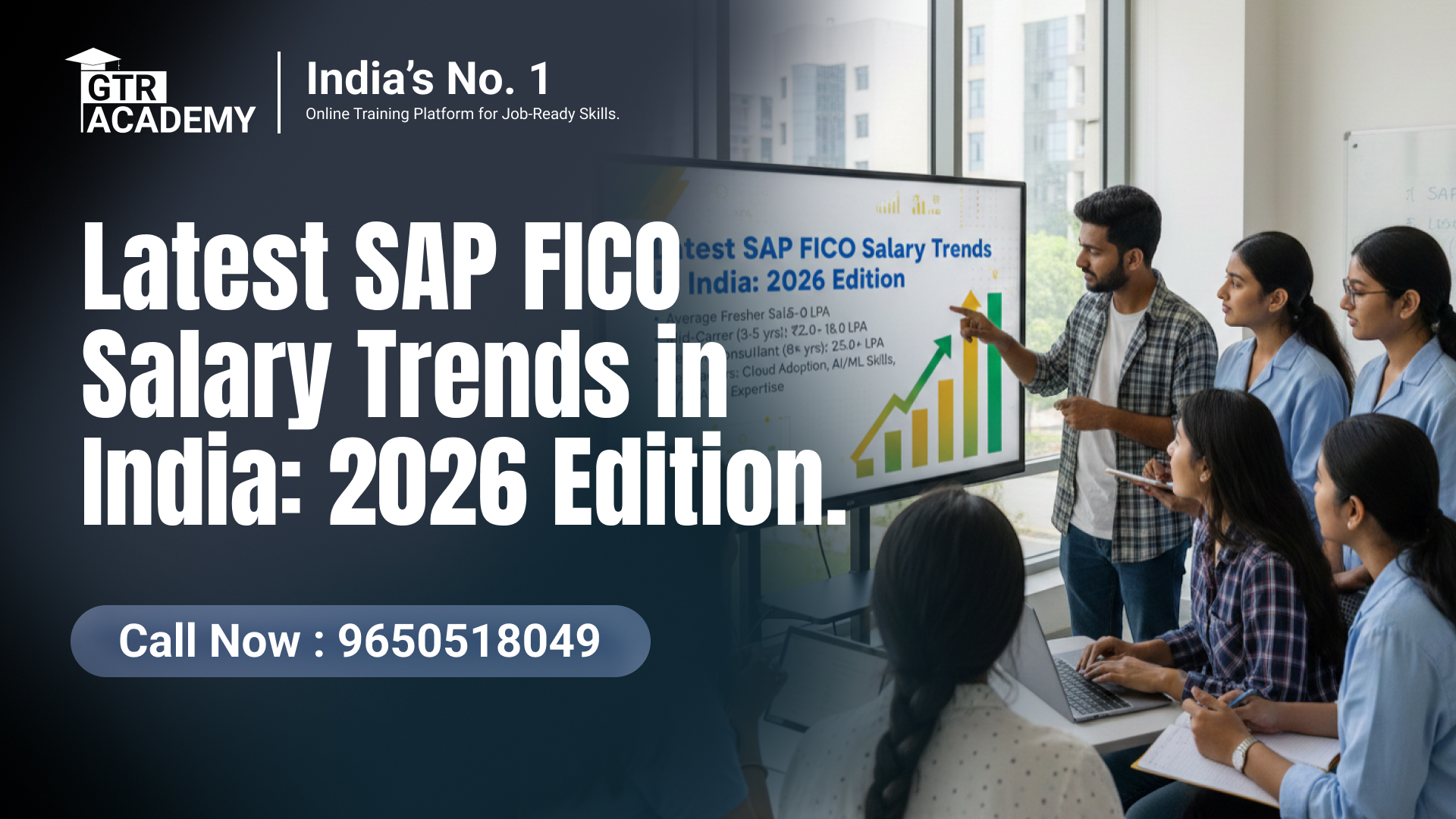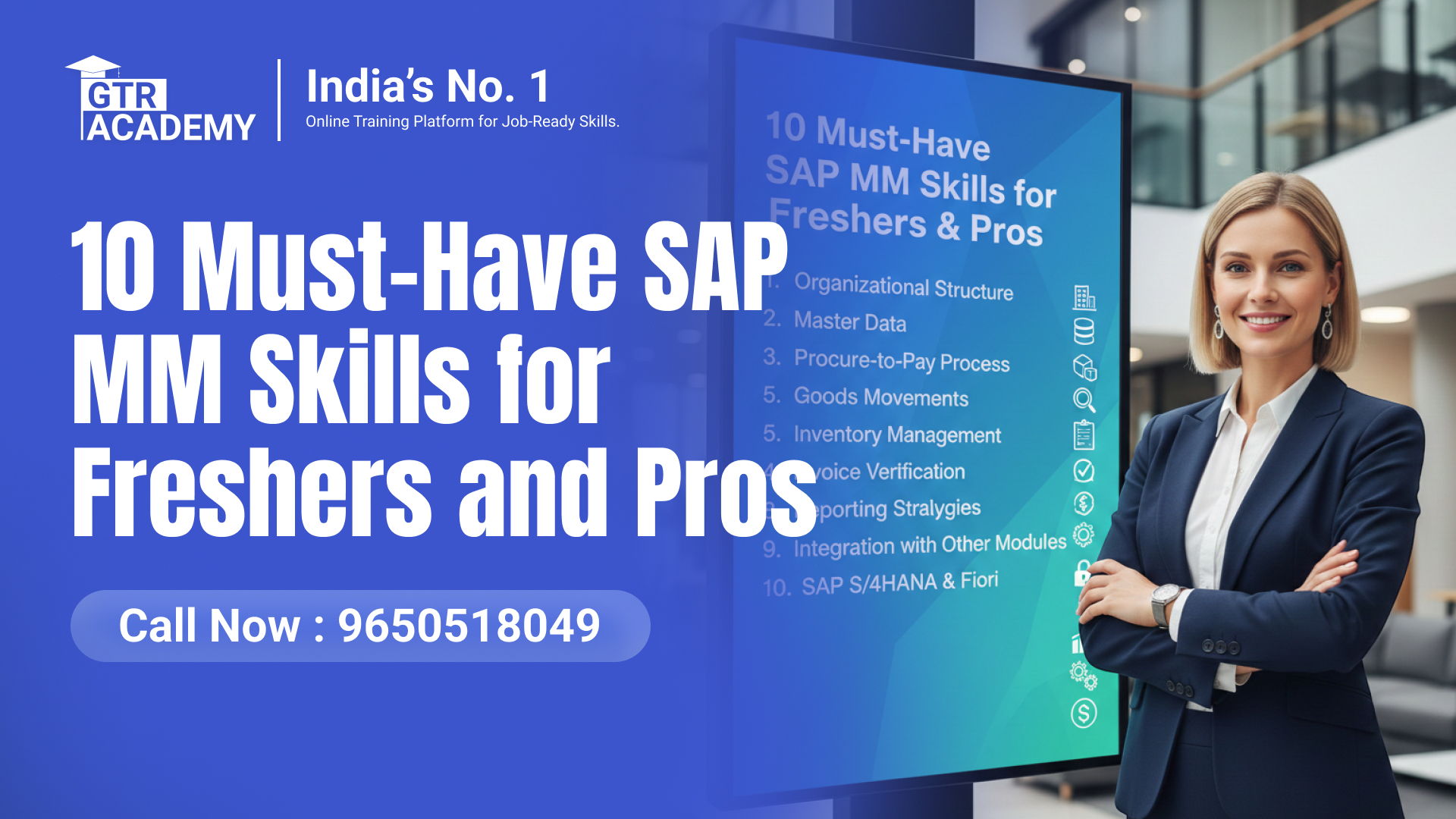In today’s business world, efficiency, accuracy, and automation are key to success. Organizations across the globe rely on SAP — a powerful ERP (Enterprise Resource Planning) software — to manage their daily business operations. Among the many SAP modules, SAP MM (Materials Management) plays one of the most important roles. It helps companies handle everything related to materials, inventory, and purchasing activities.
If you’ve ever wondered what is SAP MM module, how it works, and why learning it can boost your career, this detailed guide from GTR Academy will answer all your questions.
Connect With Us: WhatsApp

What is SAP MM Module?
SAP MM stands for “SAP Materials Management.” It is one of the core functional modules in SAP ERP that deals with material management and inventory management.
The main goal of SAP MM is to make sure that materials are always available in the right quantity, at the right time, and at the right place — without causing delays or excess stock.
In simple terms, SAP MM manages all the materials, products, and services that a business needs to run smoothly. It integrates with other SAP modules such as SAP FICO (Financial Accounting and Controlling), SAP SD (Sales and Distribution), and SAP PP (Production Planning) to ensure complete control over the supply chain.
SAP MM Full Form and Its Importance
As mentioned, the full form of SAP MM is SAP Materials Management. It plays a vital role in the procurement and inventory functions of an organization.
With SAP MM, companies can:
• Streamline their purchasing process
• Maintain proper inventory levels
• Track vendor performance
• Reduce manual paperwork
• Improve supply chain transparency
SAP MM ensures that every purchase, movement, and storage of materials is recorded accurately within the system.
Key Components of SAP MM
SAP MM consists of several sub-modules that work together to manage the entire material lifecycle. Some of the most important ones are:
-
Purchasing – Manages the procurement process, including purchase requisitions, orders, and vendor management.
-
Inventory Management – Handles goods receipts, issues, and transfers. It ensures materials are properly tracked.
-
Material Master Data – Maintains all information about materials, such as descriptions, units, and prices.
-
Invoice Verification – Matches purchase orders and goods receipts with invoices before payment.
-
Material Valuation – Helps in determining the value of inventory for accounting purposes.
-
Vendor Master Data – Stores supplier-related information for better procurement decisions.
SAP MM Step-by-Step Process (Example)
Here’s a simple example of how SAP MM works in a company:
-
Purchase Requisition (PR): A department requests materials needed for production.
-
Purchase Order (PO): The purchasing team creates and sends a PO to the vendor.
-
Goods Receipt (GR): Materials are received and recorded in the system.
-
Invoice Verification: The vendor’s invoice is matched with the PO and GR.
-
Payment: The finance department makes the final payment to the vendor.
This step-by-step process ensures accuracy and control over the entire procurement cycle.
Inventory Management in SAP MM (with Codes)
Inventory Management in SAP MM helps monitor stock levels and movements within a warehouse. It includes transactions like goods receipts, goods issues, and stock transfers.
Some common SAP MM Codes (transaction codes) used in inventory management are:
• MB1C – Enter goods receipt
• MB03 – Display material document
• MIGO – Goods movement
• MIRO – Enter invoice
• ME21N – Create purchase order
These Codes simplify daily operations and help users manage materials efficiently.
SAP MM Study Material and Learning Resources
If you’re planning to build a career in SAP, there are plenty of SAP MM study materials available online, such as:
• SAP MM module PDFs for beginners
• SAP MM module PPTs for visual learning
• Step-by-step SAP MM configuration guides
• Sample SAP MM interview questions and case studies
At GTR Academy, you get access to expert-led SAP MM online training, real-time project practice, and study materials that help you gain practical knowledge and confidence.
SAP Material Management Certification
Getting certified in SAP MM can open many career doors. The certification validates your skills and proves that you can handle SAP MM responsibilities in real business environments.
GTR Academy offers complete SAP MM training and certification support. The course includes practical lessons on SAP MM configuration, purchasing, inventory management, and integration with other SAP modules. After certification, you’ll be ready to work as an SAP consultant, analyst, or materials manager.
SAP MM Course Fees and Duration
The SAP MM course fees vary depending on the training mode (online or classroom), course duration, and level of expertise. On average, SAP MM course fees in India range between ₹25,000 to ₹50,000.
At GTR Academy, students can choose flexible learning options with affordable pricing, installment plans, and lifetime access to learning materials.
The course duration typically ranges from 2 to 3 months, depending on your learning pace.
What is SAP MM Module with Example
Let’s say a manufacturing company produces furniture. To make chairs, it needs raw materials like wood, nails, and paint.
Using SAP MM, the company can:
• Automatically generate purchase requests when stock is low
• Track which vendor supplies which material
• Check delivery timelines
• Verify and approve invoices
• Maintain accurate stock data in real time
This is a perfect example of how SAP MM simplifies material management in real-world operations.
Why Choose GTR Academy for SAP MM Training?
GTR Academy is one of the best institutes for SAP MM online training and certification. The academy provides:
• Expert trainers with real SAP industry experience
• Hands-on practice using live SAP ERP systems
• Updated SAP MM syllabus based on current trends
• Placement assistance and career guidance
• Study materials, PDFs, and mock interviews
Whether you are a student, working professional, or beginner in IT, GTR Academy offers flexible learning options to help you master SAP MM with ease.
Career Opportunities After SAP MM Training
After completing your SAP MM certification, you can apply for roles like:
• SAP MM Consultant
• Procurement Executive
• Materials Manager
• Inventory Analyst
• Purchase Officer
• SAP End User
With industries like manufacturing, retail, healthcare, and IT depending on SAP, the job market for SAP MM professionals is growing rapidly.
Top 10 FAQs about the SAP MM Module
1. What is SAP MM in simple words?
SAP MM (Materials Management) is a module in SAP ERP that helps businesses manage purchasing, inventory, and material handling efficiently. It ensures that materials are available in the right quantity and at the right time for smooth business operations.
2. What is the full form of SAP MM?
The abbreviation SAP MM stands for SAP Materials Management. It is an essential part of SAP ERP used for managing materials, inventory, and procurement processes.
3. What are the main functions of SAP MM?
The main functions of SAP MM include purchasing, inventory management, material valuation, invoice verification, and vendor management. It automates and simplifies all material-related business activities.
4. What is an example of SAP MM in real life?
Suppose a company manufactures cars. To produce them, it needs parts like engines and tires. SAP MM helps the company manage supplier data, create purchase orders, receive materials, check invoices, and maintain proper stock levels — all in one system.
5. What is the key Codes used in SAP MM?
Some commonly used SAP MM Codes include:
• ME21N: Create Purchase Order
• MIGO: Goods Movement
• MIRO: Invoice Verification
• MB1C: Enter Goods Receipt
• MMBE: Stock Overview
6. What is the SAP MM syllabus?
The SAP MM syllabus typically covers:
• Introduction to ERP and SAP
• Master Data (Material, Vendor)
• Procurement Process
• Inventory Management
• Valuation and Account Determination
• Invoice Verification
• Integration with SAP FI and SD
GTR Academy offers a complete SAP MM syllabus with hands-on training and real-world projects.
7. What is the average SAP MM course fee?
The SAP MM course fees vary by institute and location. On average, it ranges from ₹25,000 to ₹50,000 in India.
GTR Academy provides affordable SAP MM training with flexible payment options and certification support.
8. What are the career opportunities after SAP MM training?
After SAP MM training, you can work as an SAP MM Consultant, Materials Manager, Procurement Executive, Inventory Analyst, or SAP End User. Many industries, such as manufacturing, retail, and IT, actively hire SAP MM professionals.
9. What are SAP MM interview questions for beginners?
Some common SAP MM interview questions include:
• What is the difference between Purchase Requisition and Purchase Order?
• What are the steps in the procurement cycle?
• What are movement types in SAP MM?
• Explain Goods Receipt and Goods Issue.
• How does SAP MM integrate with SAP FI and SD?
GTR Academy provides detailed interview preparation and real-world examples to help students succeed.
10. Why should I learn SAP MM from GTR Academy?
GTR Academy is recognized as one of the top institutes providing comprehensive SAP training programs, offering:
• Live SAP server access for practice
• Experienced SAP-certified trainers
• Real-time project training
• Placement assistance and interview guidance
• Study materials, PDFs, and mock tests
Learning SAP MM from GTR Academy ensures you gain both theoretical knowledge and practical skills to build a strong career in the SAP domain.
Connect With Us: WhatsApp
Conclusion
The SAP MM module is the backbone of material and procurement processes in any organization using SAP ERP.
Learning SAP MM not only enhances your technical skills but also opens doors to global career opportunities.
If you’re ready to begin your SAP journey, GTR Academy is here to guide you with expert-led courses, practical training, and 100% placement support.
I am a skilled content writer with 5 years of experience creating compelling, audience-focused content across digital platforms. My work blends creativity with strategic communication, helping brands build their voice and connect meaningfully with their readers. I specialize in writing SEO-friendly blogs, website copy, social media content, and long-form articles that are clear, engaging, and optimized for results.
Over the years, I’ve collaborated with diverse industries including technology, lifestyle, finance, education, and e-commerce adapting my writing style to meet each brand’s unique tone and goals. With strong research abilities, attention to detail, and a passion for storytelling, I consistently deliver high-quality content that informs, inspires, and drives engagement.









